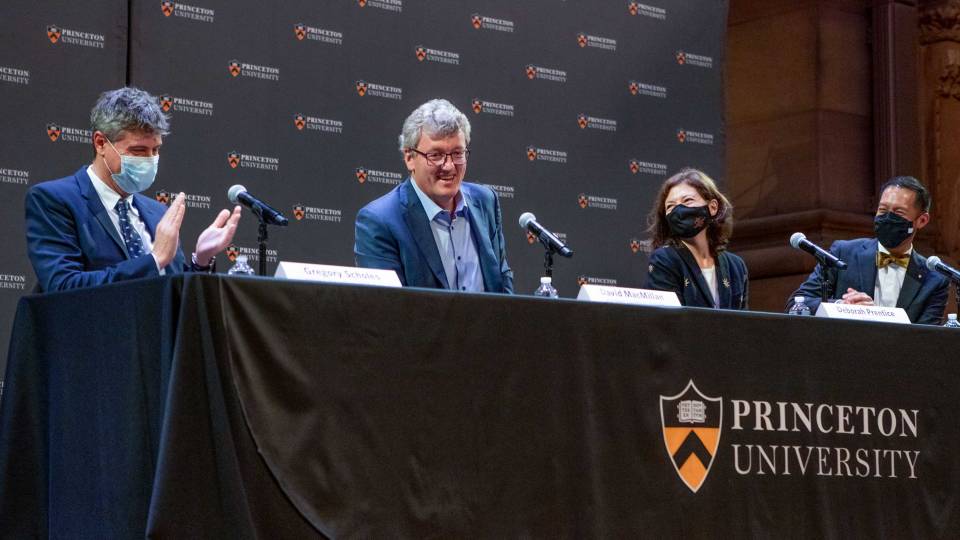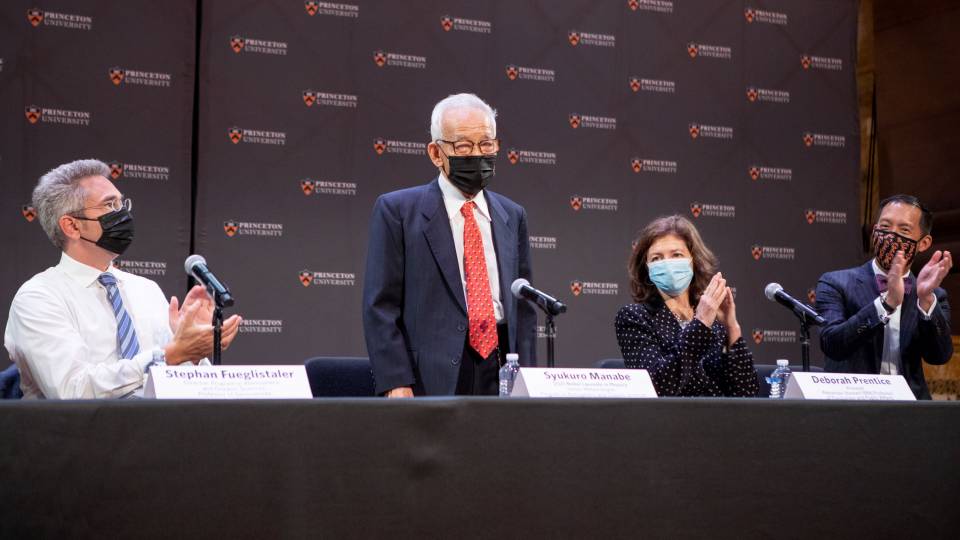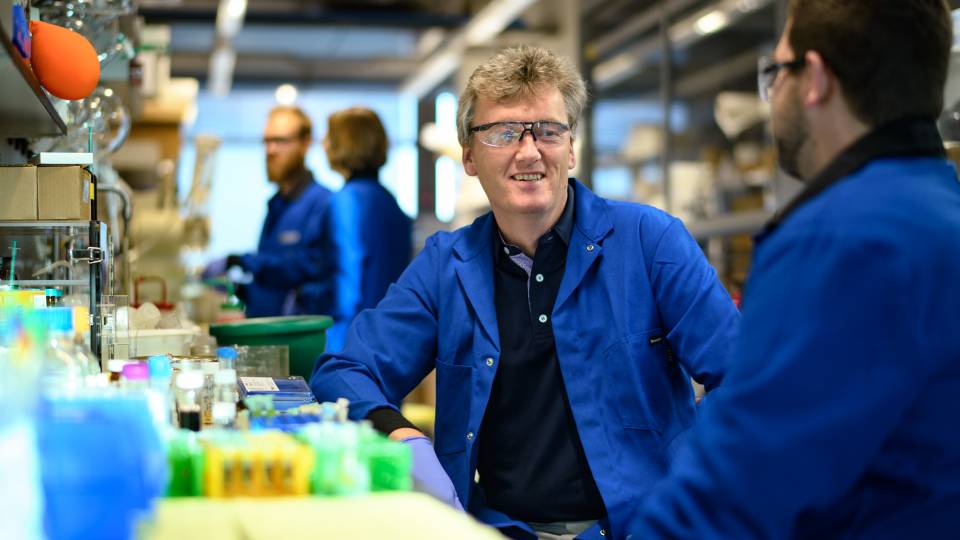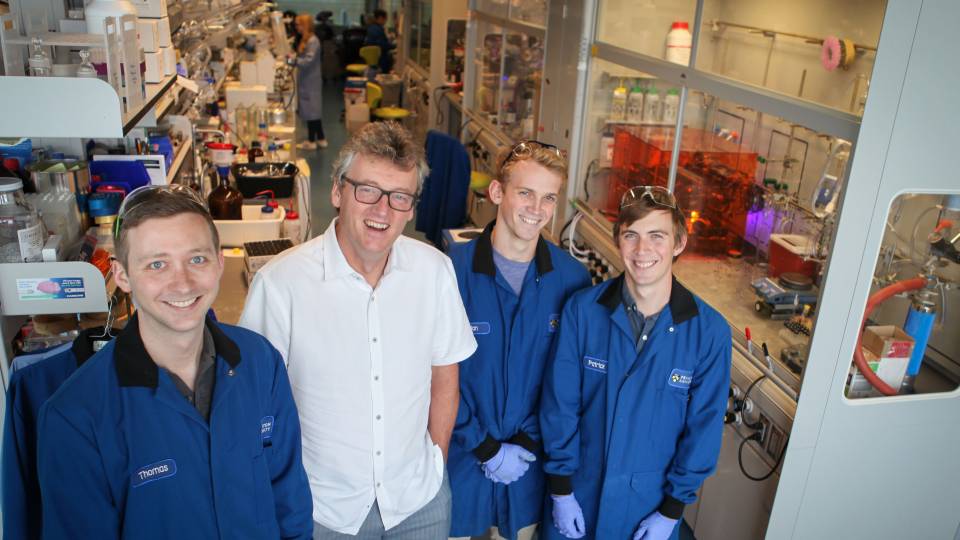Princeton's five Nobel Prize laureates for 2021 delivered their Nobel lectures and were awarded their Nobel Prize medals and diplomas in ceremonies across the country and the world this week. Pictured: At a Dec. 6 celebration at the National Academy of Sciences in Washington, D.C., Joshua Angrist (left), a 1989 Princeton Ph.D. who shared the Nobel Prize in economic sciences, David MacMillan, the James S. McDonnell Distinguished University Professor of Chemistry, and Syukuro "Suki" Manabe, a senior meteorologist in the Program in Atmospheric and Oceanic Sciences, show off their medals.
In ceremonies across the country and the world Dec. 6-10, Princeton’s five Nobel Prize laureates for 2021 — Syukuro Manabe (physics), David MacMillan (chemistry), Joshua Angrist (economic sciences), David Card (economic sciences) and Maria Ressa (Nobel Peace Prize) — delivered their Nobel lectures and were awarded their Nobel Prize medals and diplomas.
“Princeton is proud of Dr. Manabe and Professor MacMillan and our alumni — Maria Ressa, Joshua Angrist and David Card — all Princetonians recognized this year as Nobel laureates,” said Ben Chang, University spokesperson. "This recognition reaffirms the University’s commitment to placing big bets on talent, excellence, and, as Dr. Manabe might put it, curiosity-driven research. When paired with the generosity of our alumni and government support, fundamental research can have a truly transformative impact on society and the world.”
The extended week of celebrations was a concession to the COVID-19 pandemic. Instead of traveling to Stockholm for the traditional Dec. 10 awards ceremony, held annually on the anniversary of Alfred Nobel’s death, Nobel Prize recipients in the sciences, literature and economic sciences were fêted in their home countries.
”Since you cannot go to Stockholm, your medals and your diplomas have come to you,” Karin Olofsdotter, Swedish ambassador to the United States, told Manabe, MacMillan and Angrist at the East Coast Nobel Prize ceremony in Washington, D.C., that opened the week Monday. On Wednesday, the celebrations moved to Irvine, California, where Card was honored in the West Coast ceremony. The four Princeton winners’ Nobel Prize lectures were pre-recorded and livestreamed globally Wednesday morning.
Nobel Peace Prize winners Maria Ressa, a member of the Class of 1986, and Russia’s Dmitry Muratov received their medals and diplomas live in Oslo on Friday and presented their Nobel lectures. Ressa spoke of her truth-seeking commitment as a journalist, even at the risk of her own life.
“Without facts, you can’t have truth. Without truth, you can’t have trust. Without trust, we have no shared reality, no democracy, and it becomes impossible to deal with our world’s existential problems: climate, coronavirus, the battle for truth,” Ressa said.
A gala Nobel Prize broadcast from Stockholm closed the week and included clips from the various ceremonies.

Manabe, who received his Nobel "for the physical modeling of Earth’s climate, quantifying variability and reliably predicting global warming,” speaks with members of the press following the ceremony in Washington, D.C.
Monday: The East Coast ceremonies
After being celebrated at a scientific symposium at the Swedish Embassy on Monday morning, Princeton’s East Coast laureates arrived for the formal Nobel Prize ceremony at the U.S. National Academy of Sciences (NAS), where a monumental outdoor sculpture of Albert Einstein greets visitors.

MacMillan (left) and Manabe display their Nobel medals at the ceremony in Washington, D.C. “I feel everything,” said MacMillan, who attended in traditional Scottish dress, wearing a kilt. “I feel sentimental. I feel over the moon. I feel like I'm going to start crying.” Manabe said: “I never expected to win this award, so it’s a big surprise. Right now, I’m very happy.”
Inside, onstage in the academy’s auditorium, NAS president Marcia McNutt introduced the three honorees in turn, citing their Nobel Prize-winning achievements: Manabe, a senior meteorologist in the Program in Atmospheric and Oceanic Sciences, “for the physical modeling of Earth’s climate, quantifying variability and reliably predicting global warming”; MacMillan, the James S. McDonnell Distinguished University Professor of Chemistry, “for the development of asymmetric organocatalysis”; and Angrist, a 1989 Princeton Ph.D. now at MIT, for “methodological contributions to the analysis of causal relationships.”
As family members beamed from the front rows, the laureates were then called individually to receive their medals and diplomas in a warm and sometimes lighthearted ceremony — Maria Brogren, the science and innovation counselor for the Embassy of Sweden, referred to the laureates as “rock stars” and the Nobel Prize as “the Grammy of science” — as their fellow winners applauded from their seats onstage. On campus at a watch party in the Department of Chemistry’s Taylor Auditorium, graduate students and postdocs from MacMillan’s lab cheered remotely.
Ambassador Olofsdotter handed the laureates their Nobel Prize medals and diplomas on behalf of King Carl XVI Gustaf of Sweden.
McNutt concluded the presentation saying, “Congratulations laureates, you are now official.”
“I never expected to win this award, so it’s a big surprise,” Manabe said afterwards. “Right now, I’m very happy.”
“I feel everything,” said MacMillan, who attended in traditional Scottish dress, wearing a kilt. “I feel sentimental. I feel over the moon. I feel like I'm going to start crying.”
“I’m honored,” said Angrist, who acknowledged both his fellow laureate Card, who was one of his doctoral advisers at Princeton, and Orley Ashenfelter, the Joseph Douglas Green 1895 Professor of Economics, “who is godfather to us all.”
Watch the full East Coast livestream online.
Wednesday morning: The Nobel Prize lectures
Each Nobel laureate delivers a lecture that sheds light on the subject for which they were honored; these are traditionally given during the week leading up to the Dec. 10 ceremony. This year, the laureates pre-recorded their talks, which were livestreamed on Wednesday, Dec. 8.

Angrist displays his Nobel medal at the Washington, D.C, event.
In his physics lecture, Manabe thanked Joseph Smagorinsky, the inaugural director of the Geophysical Fluid Dynamics Laboratory and creator of Princeton’s Program in Atmospheric and Oceanic Sciences. “It has been a great privilege and pleasure to work at the Laboratory, unraveling the secret of climate change,” he said. Then Manabe laid out the connection between increasing greenhouse gases and rising temperature — the fundamental relationship that he first quantified and modeled in the 1960s and which has provided the backbone for every climate model that followed.
The climatologist further tied rising temperatures to changes in global water distribution, predicting increasingly severe droughts in dry regions and heavier rains in wet regions. He concluded, "The implied amplification of existing differences in water availability between water-poor and water-rich regions presents a very serious challenge to the water resources managers of the world.”
In his chemistry lecture, MacMillan honored his fellow laureate, Benjamin List, then gave a dynamic, multimedia answer to the question he has gotten most often in the past two months: What is asymmetric organic catalysis? He mentioned its applications, which range from drug manufacturing to the beauty industry to addressing plastic pollution in the oceans. (Asymmetric organic catalysis can break plastic down into its constituent materials, making it infinitely recyclable.) MacMillan also honored the work of his mentors, colleagues and students, naming dozens of organic chemists from around the world. “If it wasn't for the contributions of all these people, this field simply would not exist, and I certainly wouldn't be standing here right now, giving this speech,” he said.
He concluded by dedicating the talk to “three people who are not here”: his late parents and Carlos Barbas, an early pioneer in the field with MacMillan and List who died in 2014.
In their lectures, Angrist and Card, a 1983 Princeton Ph.D., gave nods to the foundational work of their doctoral advisers, collaborators and graduate advisees in Princeton’s Department of Economics.
Card, who received his Nobel for “empirical contributions to labour economics,” credited his and Angrist’s thesis adviser Ashenfelter, with making an early plea in the field for randomized experiments, at a time when empirical experiments in economics were widely denigrated.
He dedicated his lecture to the memory of Princetonians Alan Krueger, Robert LaLonde (Ph.D., 1985) and John DiNardo (Ph.D., 1990). He and Krueger, the James Madison Professor of Political Economy, had collaborated to pioneer what is known as “the credibility revolution” in economics, bringing empirical work to the fore. Krueger even subscribed the economics department to the New England Journal of Medicine as they were beginning to think about the potential for good research design, Card said.
In his Nobel lecture, Angrist recognized groundbreaking research by Ashenfelter and Card, and called them “among the most prolific graduate advisers economics has ever known.”
Recalling his early days in the field at Princeton, Angrist described how he computed his thesis results — an econometric analysis of Vietnam-era conscription — on a “big, hairy mainframe monster,” mounting nine-track tapes “the size of a cheesecake” onto a communal hard drive in a leased space.
“Thankfully, empirical work today is a little less labor intensive,” he said.
Watch all the 2021 Nobel Prize lectures online.
Wednesday afternoon: The West Coast ceremonies

David Card with his medal for economic sciences at the Dec. 8 Nobel ceremony in Irvine, California.
Card accepted his award on Wednesday afternoon from Swedish Ambassador Karin Olofsdotter in a ceremony held at the Beckman Center of the National Academies of Sciences and Engineering in Irvine, California.
Also accepting their prizes at the West Coast ceremony were Guido Imbens, The Applied Econometrics Professor and Professor of Economics at the Stanford Graduate School of Business, who shared half of the Nobel in economic sciences with Angrist, and David Julius and Ardem Patapoutian, the 2021 Nobel recipients in physiology or medicine.
Angrist and Imbens’ work built off of Card and Krueger’s studies, creating even more sophisticated statistical techniques by which to examine cause and effect.
Watch the full West Coast livestream online.
Friday: The Peace Prize awards and lectures in Oslo
Speaking live at the Nobel Peace Prize ceremony in Oslo, Norway, Ressa said it had been unclear if she would be able to leave the Philippines for the event.
“I didn’t know if I was going to be here today,” Ressa told the socially distanced audience gathered at the Norwegian Nobel Institute. “Every day, I live with the real threat of spending the rest of my life in jail just because I’m a journalist. When I go home, I have no idea what the future holds, but it’s worth the risk.”
Ressa, CEO and president of the Philippines-based news organization Rappler.com, said her team’s work is rooted in this question: What are you willing to sacrifice for the truth?
Ressa’s commitment to truth is a value she learned from her family, Filipino culture, Princeton education and journalism career. For her dedication to service and humanity, Ressa also will receive Princeton’s top undergraduate alumni award as part of Alumni Day in February 2022.
“At the core of journalism is a code of honor. And mine is layered on different worlds — from how I grew up, when I learned what was right and wrong; from college, and the honor code I learned there; and my time as a reporter, and the code of standards and ethics I learned and helped write,” she said. “Add to that the Filipino idea of ‘utang na loob’ — or the debt from within — at its best, a system of paying it forward.”
Rappler’s reporting on the authoritarian administration of Philippine President Rodrigo Duterte has been met with continual political harassment and arrests by the Duterte government, and Ressa has been forced to post bail 10 times to stay free.
“The more I was attacked for my journalism, the more resolute I became,” she said. “I had firsthand evidence of abuse of power. What was meant to intimidate me and Rappler only strengthened us.”
To aid in the dissemination of truth over lies and facts over rumors, Ressa said governments, public organizations and private companies must do more to address misinformation and hate spread through social media networks and information technology platforms. “They are — by design — dividing us and radicalizing us,” she said.
Ressa said it is essential to support objective journalism — to rethink the business model to sustain independent news outlets and to protect journalists who are being arrested and killed for their work in countries around the world.
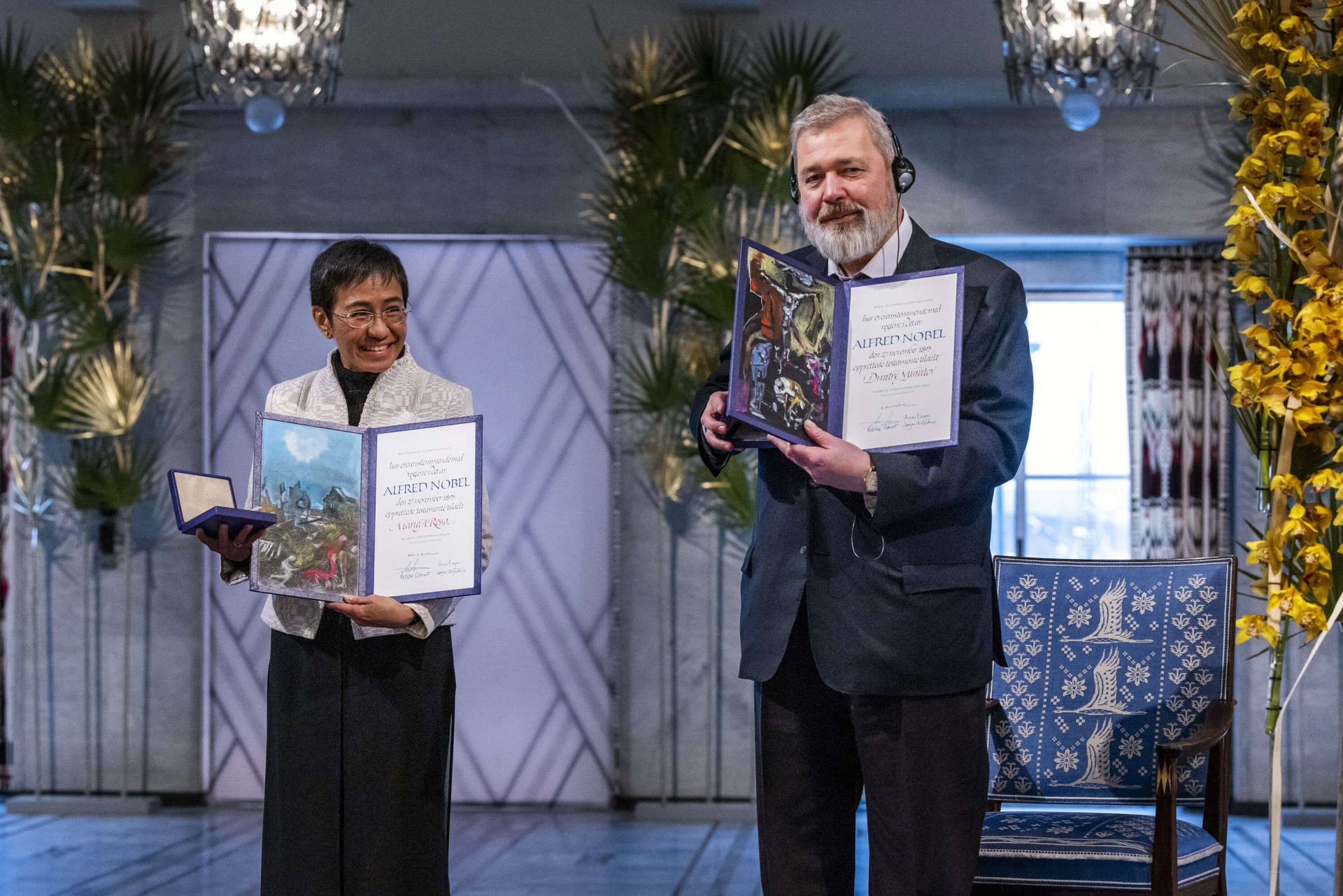
Maria Ressa and Dmitry Muratov show off their Nobel Peace Prize diplomas at the Dec. 10 ceremony in Oslo.
Ressa noted that the last working journalist to receive the Peace Prize, anti-Nazi activist Carl von Ossietzky, never made it to Oslo in 1936 to accept his award. He had been arrested in Germany and was languishing in a concentration camp at the time of the ceremony.
“By giving this to journalists today, the Nobel committee is signaling a similar historical moment, another existential point for democracy,” she said. “Dmitry and I are lucky because we can speak to you now, but there are so many more journalists persecuted in the shadows with neither exposure nor support, and governments are doubling down with impunity.”
Ressa continued: “We are standing on the rubble of the world that was, and we must have the foresight and courage to imagine what might happen if we don’t act now, and instead, create the world as it should be — more compassionate, more equal, more sustainable. To do that, please ask yourself the same question my team and I had to confront five years ago: What are you willing to sacrifice for the truth?”
Following their lectures, Ressa and Muratov received congratulations from Their Royal Highnesses King Harald V and Queen Sonja of Norway, along with the official citations and medals from the Norwegian Nobel Committee.
Watch the Oslo Peace Prize ceremonies online.
Friday: The traditional Dec. 10 Nobel Prize Ceremony from Stockholm
The week of festivities concluded with an award ceremony livestreamed from the Blue Hall at the Stockholm City Hall in Sweden, decorated with a floral arrangement embracing the theme “the light at the end of the tunnel.”
As the Royal Stockholm Philharmonic Orchestra, conducted by Cathrine Winnes, played the Swedish Royal Anthem, the 250 guests rose for members of the Swedish royal family: King Carl XVI Gustaf, Queen Silvia, and Crown Princess Victoria and her husband Prince Daniel.
Swedish actress Lena Olin, master of ceremonies, said: “Dear Laureates, you give us hope, hope to understand more, hope for compassion and hope for peace. … Your work and groundbreaking discoveries have opened our minds to unknown worlds, brought us cures, scientific knowledge and social justice. … We hope [your work] will inspire young, brilliant minds all over the world.”
Olin noted that music has always been a rich tradition of the awards ceremony. This year, Swedish musical artists including vocalists Anne Sofie von Otter and Kiralina Salandy, accordionist Bengan Janson and trombonist Karin Hammar performed works ranging from the fourth movement of Mozart’s Symphony No. 35 and Swedish folk music to Joni Mitchell’s “Both Sides Now.”
“Throughout the pandemic we have been reminded of the importance of science to find solutions to complex problems,” said the evening’s host, Nobel Foundation Chair Carl-Henrick Heldin. He emphasized that the next goal is to make the vaccine available around the world and encourage people to believe it works. “How can we make people trust in scientific facts rather than relying on unverified information and even conspiracy theories?” he said. “This is an important task for us if we are to be successful in dealing with our common challenges. Global problems can only be solved by global collaboration carried out in good faith.”
He continued: “Alfred Nobel believed in our ability as humans to constantly develop and improve the world around us. More than ever, we need what Alfred Nobel called for: great efforts for the benefit to humankind. And we need collaboration between disciplines and across borders.”
After an introduction given onstage in Stockholm by members of the Royal Swedish Academy of Sciences and other Swedish scientific and academic institutions for each award, a clip was shown of each Nobel laureate in the sciences, literature and economics receiving their medals in their home country — from Washington, D.C, and Irvine, California, in the U.S., to Berlin, Rome and London.
Olin closed the ceremony “from winter-cold Stockholm” with this message for all the laureates: “We’d like to forward our deepest congratulations to you, wherever you are in the world. This year’s prizes clearly illustrate hope, action and … truth in its various forms: scientific knowledge, the human experience and the fundamental rights of journalists to report facts.”
Watch the Stockholm Nobel Prize ceremony online.
Emily Aronson, Becky Batcha, Liz Fuller-Wright, Wendy Plump, Jamie Saxon and Denise Valenti contributed to this story.

“Earth from Space,” an installation by Andreas Skärberg, lights up the sky in Stockholm during December as part of the second annual Stadshuset Nobel Week Lights, inspired by Nobel Prize-awarded discoveries and laureates.





